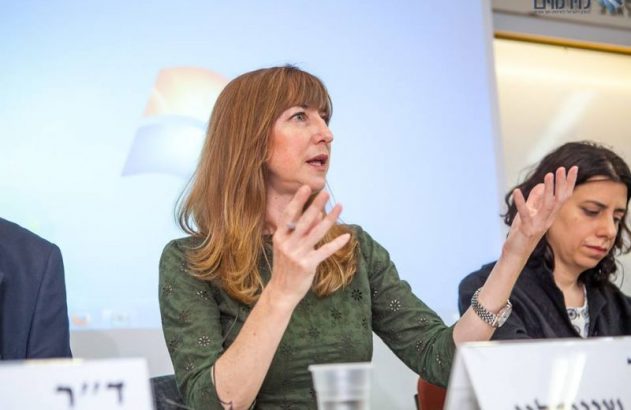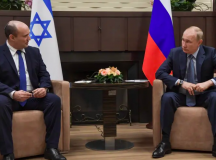Dahlia Scheindlin, writing from Tel Aviv on 15 March, critically assesses the three reasons the Israeli government has given for its neutrality in the war between Russian and Ukraine
Within the first week of Vladimir Putin’s war on Ukraine, Israel gave the clearest possible signal about its emerging policy of total ambiguity. First, Israel declined to support the US effort to condemn Russia at the United Nations Security Council. Days later, Israel then supported a UN General Assembly resolution – the toothless form of diplomacy that Russia’s president did not seem to notice.
Looking at the totality of Israel’s policy regarding Russia and Ukraine, one word best describes Israel’s approach: ‘hedge.’ Beyond hedging its statements at the United Nations with a ‘this, and that’ approach, Israel has hedged its position in all other areas of policy regarding Russia and Ukraine.
At the level of political rhetoric, Israeli leaders displayed a division of labor: Prime Minister Naftali Bennett walked a line expressing solidarity with Ukrainian suffering while he refrained from condemning or even naming Russia as the source of the suffering – as if the cluster bombs and vacuum bombs to come were heaven sent. Foreign Minister Lapid hedged Bennett’s neutrality with a clearer statement condemning Russia’s attack. But both kept their remarks limited; Bennett still hasn’t personally condemned Russia, and Lapid became more vociferous only in recent days, over two weeks into the savage war.
At the economic level, Israel has not joined Western sanctions. Some banks have taken responsibility individually to announce restrictions on trade in rubles or with Russian banks; private firms have scrambled to keep in compliance with Western sanctions, and in a briefing by the Ministry of the Economy intended to provide guidance, officials ultimately told each company to consult with a lawyer. Israel has said it will seek to prevent oligarchs from stashing planes, yachts or themselves, in Israel. ‘Israel will not be a route to bypass sanctions,’ said the Foreign Minister this week; a roundabout statement that gives no indication Israel might consider joining the sanctions, prompting the U.S. under secretary of state for political affairs to ask Israel to do so outright.
At the humanitarian level, Israel has committed the most conspicuous hedge of all: Those members of the government charged with humanitarian concerns for the Ukrainian wounded, and those fleeing, such as the Minister of Health Nitzan Horowitz (Meretz) and Minister for Diaspora affairs Nahman Shai (Labor), speak earnestly of Israel’s moral responsibility in their respective areas. Horowitz is working to send medical aid and establish a cutting-edge, high-tech field hospital (which is only now being approved and getting underway). Shai has argued that Israel must embrace refugees as its moral and historical duty, not just Jewish Ukrainians eligible for Israel’s right of return. But his view made little headway for two long weeks of war, while Israel’s Minister of the Interior Ayelet Shaked, of Bennett’s Yemina party, insisted on a vanishingly small quota for non-Jewish refugee seeking asylum, alongside punishing financial deposits to ensure their exit while celebrating unlimited entry for those of the right religion. These contradictions represent hedging within the coalition, even on the humanitarian aspect Israel claimed as the centerpiece of its policy.
The refugee policy was so controversial within Israel, that during the course of writing this article, the Interior Minister announced a dramatic reversal. Now Israel will relax the quota and allow refugees who have family members currently living in Israel – but this policy too is hedged. Their families need to sign a guarantee and give them a place to stay, they can apply for asylum but might not receive it, and the online forms are hard to access. Israelis who have tried to assist those arriving at the airport, and those with family member seeking entry, have complained on social media that through bureaucratic chaos, they feel Israel is doing everything it can to discourage non-Jewish refugees from coming.
Beyond diplomacy, economic tools, and the humanitarian field, on one issue Israel has not hedged at all: weapons. On the question of military support, Israel’s position has been famously, unambiguously, no. No defensive missile systems, such as Iron Dome. No surface to air missiles akin to the Javelin, the American hardware that has helped save Ukraine from instant annihilation. Israel has even declined to supply protective gear – no helmets, no armored vests, nothing. The image of Ukraine’s ambassador to Israel pleading for help while wearing a helmet in symbolic protest has become iconic.
Arguments for Neutrality Assessed
How is the government explaining – and defending – its approach? Was the policy of ambiguity justified – and is it still? From the earliest days, government figures pushed two main lines. First, Israel must be careful to protect the large Jewish population that still lives in Russia. Second, Israel’s very security – which in the Israeli popular imagination is always existentially threatened – depends on the cooperation with Russia in the Syrian arena.
Russia intervened in Syria’s civil war in 2015, propped up the Assad regime, and flew the planes that committed some of the war’s worst atrocities. When the current war began, Israeli policymakers quickly observed that ‘Israel shares a border with Russia,’ in reference to Syria, and must tread with caution. The rapid messaging indicated that Israel’s government was well-prepared for the scenario and had considered how to communicate the need for neutrality in advance.
At the center of the Syria issue lies Israel’s cautious coordination with Russia regarding Israeli activities there. This is not cooperation in any sense of joint activity, but mostly a matter of carving up time and space in the air, for Israeli planes to strike Iranian targets in Syria, without crashing into Russian planes. Israel began striking Iranian targets in Syria and weapons convoys bound for Hezbollah in Lebanon under the Netanyahu years, at least since 2013. In recent years, the strikes have represented an important factor in Israel’s containment of Hezbollah in Lebanon, and Iran’s presence in Syria.
To these early arguments, just over one week into the war, Israel added a third justification for its position. Already the day after the war began, Israeli news reported that Ukrainian President Volodymyr Zelensky asked Naftali Bennett to mediate with Putin. Bennett was apparently reluctant when Zelensky first asked him to do so in the months prior to the invasion. However, having acceded to the role of mediator, the government seemed to use it to justify the neutrality position with Russia in hindsight.
Do these three reasons justify Israel’s policy on the war?
The question of how best to protect Jews in Russia is hard to assess. But any threat against Russian Jews is hypothetical at present. Putin has proved himself capable of anything; but with no evidence or indications of anti-Jewish measures in Russia up to now, the threat of tactical nuclear strikes – which he has openly conveyed – is frankly more urgent. Stopping Putin must be the world’s number one goal.
The Israeli negotiation role is not hypothetical. Widely predicted to be a failure, the conversations have nevertheless continued from Naftali Bennett’s surprise visit to Moscow on 5 March, to the present. Nearly every day brings new reports of phone calls between Bennett and Putin, Bennett and Zelensky and with other world leaders. But each day also brings horrors perpetrated by Russian forces in Ukraine – bombing a maternity hospital; starving and freezing civilians of besieged cities, attacking on Ukraine’s western-most territories, killing journalists. By the time this is published, Putin may have struck NATO territory, and nobody should view that as an accident. The negotiation created a razor-thin line for Israel’s credibility, between vindication should a ceasefire materialise, and abomination if Putin ultimately exploited Israel’s good offices to buy time to do more evil. Zelensky’s team has its doubts – days ago an official in his office complained that Israel was using the negotiations to justify Israel’s fence-sitting, although at other points Zelensky’s advisors have also expressed hopes for Bennett’s channel. But success remains hypothetical – the results could easily tip towards failure.
The final consideration is security, and there is nothing hypothetical about it. Giora Eiland, retired major general and former head of Israel National Security Council emphasised in an interview that Israel is already in a sort of low-level but active, ongoing war with Iran – whether in or out of the public vision, by cyber or physical means; the security establishment calls this the ‘campaign between wars’ – or ‘Mabam’ in its Hebrew acronym (a somewhat misleading term, since Iran and Israel have never actually waged an official war with each other). Israeli strikes in Syria are essential to limiting arms transfers to the Iranian-backed Hezbollah in Lebanon and preventing Iranian entrenchment there. Russia holds advanced weapons systems in Syria, including the feared S400 surface to air systems. Eiland warned of other Russian options for expressing displeasure, such as scrambling GPS signals to interfere with Israel’s military flights, or even civilian infrastructure. ‘You don’t want them to even think of it,’ he said.
It sounds like Russia holds Israeli security in its hand. But are these fears the final word for a country that famously clings to a doctrine of self-reliance? Top Israeli leaders have described the coordination with Russia as tactical, while the relationship with the US and the west is a matter of strategy, from former foreign minister Shlomo Ben Ami to former defense minister Moshe Yaalon. The latter has a particular credibility on the issue – it was he who established the coordination between the Kremlin and Kirya, Israel’s central defense compound in Tel Aviv. If Israel takes a stronger position, Moscow could make things harder for Israel in Syria, but, said Yaalon in a phone interview, ‘If we have to fight for the freedom of action [in Syria], we’ll fight for freedom of action.’ He does not believe Putin has a great interest in threatening Israel’s capacities in Syria for various reasons, including the shared preference for containing Iran from gaining a foothold there. At a more basic level, other security figures have told me that Russia doesn’t want accidental collisions that could harm its own planes or pilots. Tzipi Livni reminded Israel’s Channel 12 that Russia is the reason Israel even has weapons targets bound for Hezbollah to strike in Syria. Brigadier general (res.) Nitzan Nuriel asserted that over the decades and wars in its history, more Israelis have died of Russian weaponry than from any other country. Russia even sold S-300 air defense missile system to Israel’s biggest nemesis, Iran. Russia too is playing tactics with Israel in Syria – this is not a friendship of loyalty or warmth.
Yaalon believes Israel needs to take a very clear position. ‘The world finds itself in a situation of change of the global order, as the result of a dictator sitting in Moscow, trying to take over a democracy, and we need to be on right side of history, strategically, morally too, not just strategically.’ As Livni told Channel 12: ‘Maybe Israel’s policy of walking between the raindrops,’ – a Hebrew expression implying nuance or even ambiguity – ‘was ok when it’s a drizzle. You can’t walk between raindrops when there’s a flood.’




































